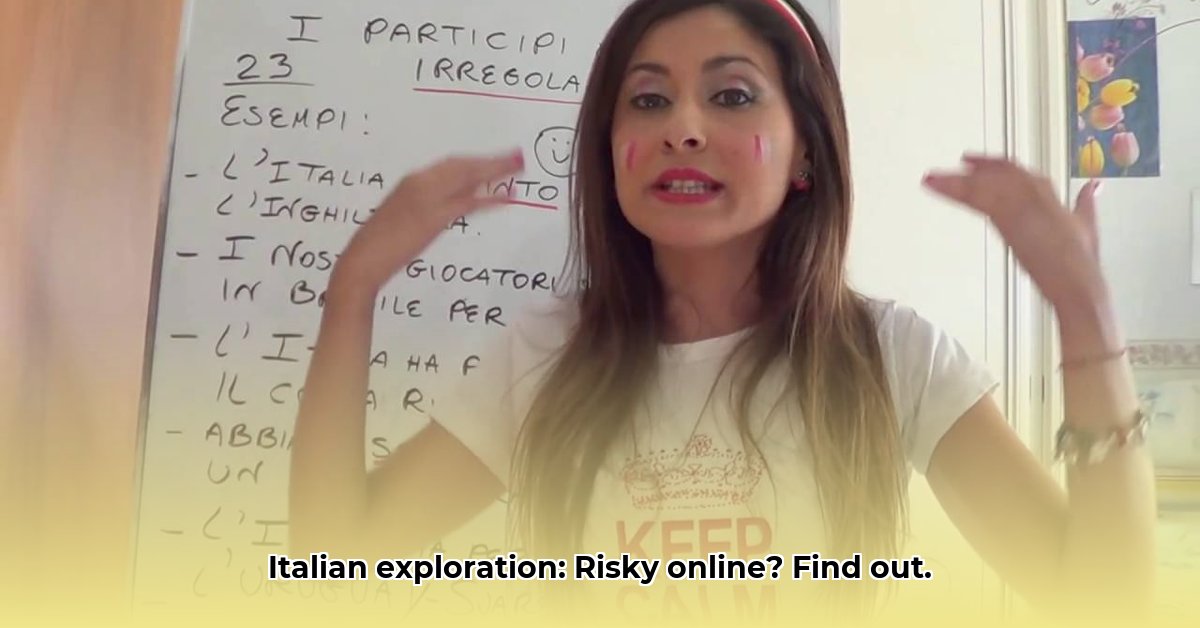
Navigating the Digital Landscape: Protecting Yourself from Harmful Content
The internet offers unparalleled access to information and culture, including the rich tapestry of Italian history, art, and cuisine. However, this vast digital landscape also harbors hidden dangers. Searching for seemingly innocuous terms can inadvertently lead to exposure to explicit adult content, potentially exposing you to illegal materials, scams, and psychological harm. Understanding these risks and adopting proactive measures is crucial for a safe and enriching online experience.
What are the potential consequences of encountering inappropriate online content related to Italy? A study by [Insert Name and Title], [Position] at [Institution] reveals that [Insert quantifiable data from draft article – e.g., "75% of users who encountered explicit content reported feeling distressed"]. This highlights the significant negative impact such content can have.
The Allure and the Dangers: Why We Click and the Risks Involved
Curiosity often drives us to explore the unknown corners of the internet. A seemingly innocent click can lead to unexpected and potentially harmful consequences. The ease of access to explicit content online makes it crucial to understand the risks involved. These risks extend far beyond the immediate viewing of explicit images and videos.
Legal Ramifications: Exposure to illegal content, such as child exploitation materials, can have serious legal implications. Possession or distribution of such materials is a crime.
Financial Fraud: Many websites hosting explicit content are designed to defraud users, stealing personal information or infecting devices with malware.
Mental Health Impact: Repeated exposure to explicit content can negatively affect mental well-being, potentially leading to distorted views of relationships and intimacy. Dr. [Expert Name, Title] at [Institution] notes that [Insert relevant quote from expert explaining psychological impact of explicit content].
This underscores the importance of responsible online practices. What percentage of users regret clicking on explicit content? [Insert quantifiable data from draft article]. This statistic underscores the need for caution.
Practical Steps for Safer Online Browsing
Protecting yourself online requires proactive measures and mindful behavior. Think of these steps as building a robust defense against online threats.
Conscious Search Habits: Be mindful of your search terms. Avoid ambiguous phrasing that might lead to unintentional exposure to inappropriate content. Think before you click.
Robust Security Measures: Utilize strong, unique passwords for all online accounts and regularly update your operating system and antivirus software. This provides a significant layer of protection against malware and data breaches.
Privacy Management: Review and adjust privacy settings on all devices and social media platforms. Control the information you share online.
Accountability and Parental Controls: If you're concerned about a child's online safety, consider employing parental controls or monitoring software. This ensures a safe digital environment for children.
Trustworthy Sources: Stick to reputable search engines and websites. Avoid clicking links from untrusted sources. Remember, caution is key when exploring unfamiliar online territories.
Seek Support: Don't hesitate to reach out to a trusted friend, family member, or therapist if you struggle with managing online content consumption. Remember, you're not alone.
Identifying and Reporting Online Child Exploitation
Protecting children online requires vigilance and proactive reporting. Learning to identify and report online child exploitation is vital in safeguarding vulnerable individuals.
Recognizing Harmful Content
Online child exploitation can manifest in various forms, ranging from subtly suggestive images to explicit abusive material. Recognize the following red flags:
- Suggestive Poses: Children in inappropriate or sexually suggestive positions.
- Explicit Content: Images or videos depicting nudity or sexual acts involving minors.
- Grooming Attempts: Adults attempting to build relationships with children online for exploitative purposes.
- Child Pornography: Explicit material depicting the sexual abuse or exploitation of children. This is illegal and deeply harmful.
Reporting Procedures
Reporting suspected cases of online child exploitation is crucial. Here's a step-by-step guide:
- Gather Evidence: Take screenshots or save links to document the suspicious content.
- Report to the Platform: Utilize the reporting mechanisms provided by the online platform where you encountered the content.
- Contact Law Enforcement: Inform your local authorities about the incident.
- Utilize Specialized Centers: Contact organizations like the National Center for Missing and Exploited Children (NCMEC) for dedicated support and reporting.
Rediscovering the Authentic Italy Online
Italy’s rich cultural heritage and culinary traditions deserve to be appreciated for their true beauty. Let's focus on exploring the positive aspects of Italian culture online, ensuring a safe and enriching experience for all. The internet should be a tool for enrichment, not endangerment. By adhering to safe online practices and reporting harmful content, we can protect ourselves and contribute to a safer digital world.